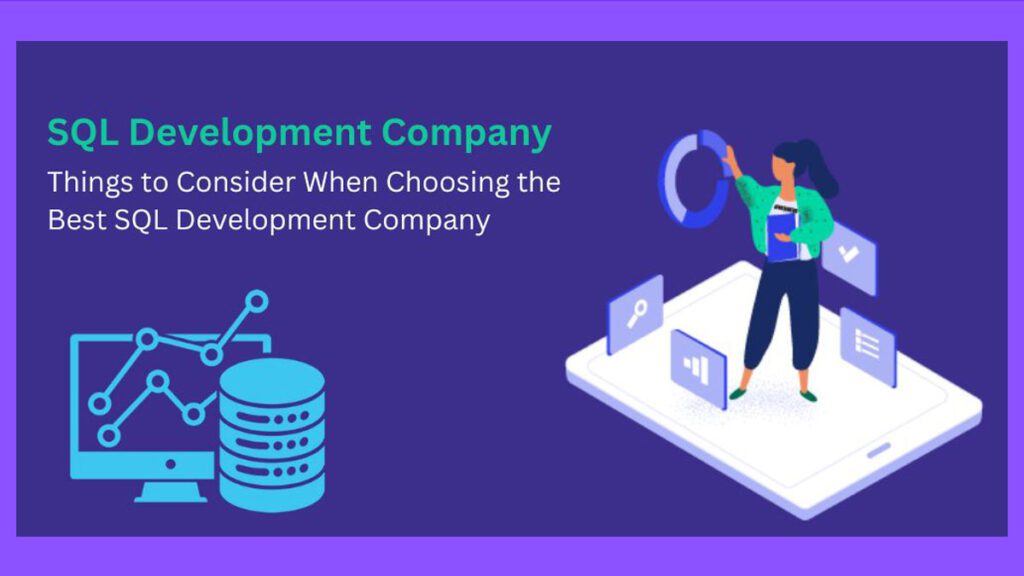Things to Consider When Choosing the Best SQL Development Company

The efficient management and manipulation of data in today’s data-driven environment depend heavily on SQL (Structured Query Language) development. Working with the best SQL development firm can make all the difference when it comes to your needs, whether you require assistance with database design, query optimization, migration, or maintenance.
The main aspects that companies should consider when choosing a SQL development firm.
1. Experience and knowledge:
The knowledge and experience of the SQL development firm should be one of your main considerations. To ascertain if they have the appropriate expertise and subject knowledge to manage your SQL development needs, look at their prior work, client recommendations, and case studies.
2. Services and Areas of Expertise:
The SQL development Company India specialized specialties and services should be taken into consideration. Do they offer comprehensive SQL development services that cover database design, query optimization, performance tuning, data migration, and maintenance? A broad selection of services will be available to you, and you won’t have to deal with the headache of working with many vendors for various SQL development-related tasks. Make sure their offers are in line with your unique needs.
3. Flexibility and scalability:
Consideration should be given to the SQL development company’s scalability and flexibility. Make sure they can manage projects of different sizes and complexity. Analyze their ability to grow their resources to your changing needs and ask if they can offer a flexible engagement model that meets your company’s particular requirements. A long-term partnership is assured by a business that can adjust to your growth and shifting needs.
4. Technology Stack and Tools:
Check the SQL development company’s expertise with the most recent SQL tools and technologies. Check to see if they are knowledgeable in well-known database management systems (DBMS), such as MySQL, PostgreSQL, Oracle, Microsoft SQL Server, or others that are compatible with your current architecture. Ask them if they are familiar with cutting-edge SQL development frameworks and tools, which can improve productivity and efficiency.
5. Data Security and Compliance:
When working with a SQL development business, data security is of the biggest significance. Make sure they adhere to strict security procedures and have safeguards in place to secure sensitive data. Take into account their cost structures, pricing strategies, and transparency of their cost breakdown. Consider the value they will provide over the long term as well, taking into account their knowledge, the standard of their output, and their capacity for timely and cost-effective delivery.
6. Collaboration and communication, respectively:
Successful SQL development cooperation depends on clear and efficient communication and teamwork. Analyze the company’s channels for communication, attentiveness, and capacity to comprehend your needs. Look for a business that prioritizes open and transparent communication, giving you frequent updates on the status of the project and actively including you in the decision-making process. To achieve congruence with your goals, a collaborative approach is encouraged.
7. Value at a Price:
Cost should not be the only criterion, even though it is a significant one. Determine the value that the SQL development firm is offering. Take into account their cost structures, pricing strategies, and transparency of their cost breakdown. Consider the value they will provide over the long term as well, taking into account their knowledge, the standard of their output, and their capacity for timely and cost-effective delivery.
8. Reviews and testimonials from customers:
Contact former or current clients of the SQL development firm to get their comments. For more information on experience, satisfaction, and the company’s capacity to deliver on promises, ask for references and get in touch with them. You may learn more about a company’s reputation and dependability by reading online reviews and ratings on reputable sites.
SQL query optimization is a critical component of relational database performance enhancement and response time improvement. Effective SQL query optimization can have a substantial influence on application performance, allowing businesses to handle massive amounts of data fast and generate useful insights.
To increase performance and efficiency, a variety of SQL query optimization techniques can be used.
1. Indexing:
Indexing is one of the most fundamental strategies for SQL query optimization. By generating data structures that enable quicker lookup processes, indexes aid in accelerating data retrieval. Investigate the query execution plans to find the columns that are commonly used in the WHERE, JOIN, and ORDER BY clauses. The performance of your queries can be significantly enhanced by adding indexes to these columns.
2. Effective Schema Design:
The performance of queries can be significantly impacted by a well-designed database schema. To prevent data duplication and ensure effective data retrieval, normalize the schema. Use the proper data types for columns to enhance processing and storage. The schema can be correctly structured to reduce data duplication and increase query performance.
3. Effective Joins:
It’s crucial to optimize join operations for optimal SQL query performance. Make sure that wherever possible, join conditions are based on indexed columns. When the null ability of columns is not necessary, think about using INNER JOINS rather than OUTER JOINs. To simplify things and speed up query execution, you should also restrict the number of tables used in joins.
Businesses can greatly improve the efficiency of their SQL queries by using techniques like indexing, query rewriting, good schema design, effective joins, and caching. By putting these SQL query optimization strategies into practice, companies can increase application response times, optimize database performance overall, and gain insights more quickly.
Conclusion:
Making the best choice for your SQL development needs is crucial because it can have a big impact on your data management and optimization efforts. Businesses can make an educated decision by considering aspects like knowledge, specialization, scalability, technological stack, data security, communication, and value. Do extensive research, weigh your selections carefully, and priorities the business that best meets your individual SQL development needs. The long-term success of your company will be aided by a well-picked SQL development partner, who will also improve your data management capabilities.


